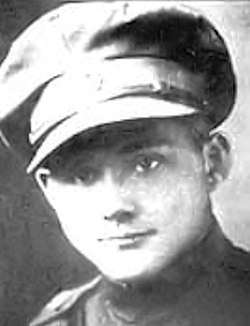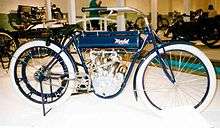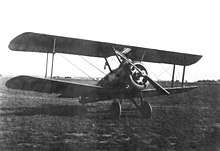Cleo Francis Pineau
Lieutenant Cleo Francis Pineau (23 July 1893—29 May 1972) was an American World War I flying ace credited with six aerial victories.[1] He was a renowned motorcycle racer both before and after the war. He later became an executive in the steel industry.
Cleo Francis Pineau | |
|---|---|
 Cleo Francis Pineau, 1918 | |
| Born | 23 July 1893 Albuquerque, New Mexico, USA |
| Died | 29 May 1972 Williamsport, Pennsylvania, USA |
| Wildwood Cemetery | Williamsport, Pennsylvania, USA |
| Allegiance | |
| Service/ | Royal Air Force (United Kingdom) |
| Years of service | 1917–1918 |
| Rank | Lieutenant |
| Unit | Royal Air Force |
| Battles/wars | |
| Awards | British Distinguished Flying Cross |
| Other work | Sparked civil aviation in Pennsylvania; became executive in steel industry |
Early life

Pineau was the son of Thomas L. and Adele Gstalder Pineau.[1] He was a restless youth, and dropped out of school in sixth grade.[2] He was a motorcycle racer before World War I.[1] He raced Flying Merkel and Indian Motorcycles, once defeating Barney Oldfield. He also rode in the "Globe of Death" motordrome as a vaudeville performer.[2] During 1914 and 1915, he rode as a professional for the Flying Merkel team.[3]
World War I

He joined the Royal Flying Corps in December 1917,[4] and trained at the Curtis Aviation School in Buffalo, New York.[2] He was assigned to No. 210 Squadron RAF on 2 June 1918. Between 6 September and 8 October 1918, he used a Sopwith Camel to destroy four Fokker D.VIIs and drive down two others. Following his sixth win, he was shot down by a Fokker Triplane near Roulers and fell into captivity as a prisoner of war.[4]
Postwar
Pineau went back to motorcycle racing in the 1920s, winning many world motordrome records.[5] Pineau did not leave aviation behind. He was instrumental in founding the Williamsport-Lycoming County Airport, and fostered it through his connections in the aviation community, including a friendship with Wiley Post.[2][5]
He began the Radiant Steel company in 1928, as a spinoff from Darling Valve and Manufacturing Company. By 1948, he was its president; he served in this capacity until he retired in 1969. He died in 1972.[5]
References
- The Aerodrome website Retrieved 18 February 2010.
- Williamsport: Boomtown on the Susquehanna. pp. 100–102.
- Staff writer (January 1975). "Joe Merkel's Yellowjackets". American Motorcyclist. American Motorcyclist Assoc. p. 15.
- Above the Trenches: A Complete Record of the Fighter Aces and Units of the British Empire Air Forces 1915–1920. p. 305.
- Williamsport (PA) Sun-Gazette, 30 May 1972, page no. unknown. Retrieved 18 February 2010.
Bibliography
- Above the Trenches: a Complete Record of the Fighter Aces and Units of the British Empire Air Forces 1915–1920. Christopher F. Shores, Norman L. R. Franks, Russell Guest. Grub Street, 1990. ISBN 0-948817-19-4, ISBN 978-0-948817-19-9.
- Over The Front: The Complete Record of the Fighter Aces and Units of the United States and French Air Services, 1914–1918 . Franks, Norman and Frank Bailey. Grub Street Publishing, 2008. ISBN 0948817542 ISBN 978-0948817540
- Williamsport: Boomtown on the Susquehanna. Robin Van Auken, Louis E Hunsinger. Arcadia Publishing, 2003. ISBN 0-7385-2438-7, ISBN 978-0-7385-2438-2.